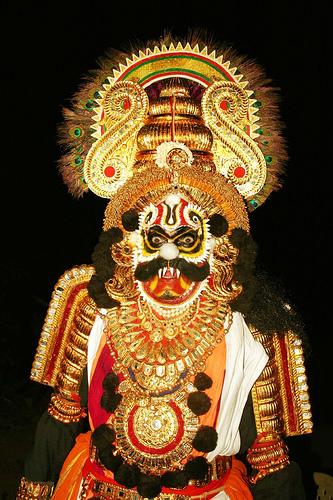RoyBatty91
New member
- Joined
- Oct 16, 2017
- Messages
- 126
This is beyond interesting - I thought I must have read this somewhere on the forums, but I looked in both the old and new archive and only saw the word show up a few times, with no explanation of what it meant. I've encountered a "very friendly" spirit, and I wanted to see/feel the emotional reaction she had to "Jews." There was definitely hatred, but she said that word itself wasn't the one that the Gods used - and that makes sense, "Jew" is the Jew's own word for a Jew, or an English version of it. When I asked what word they used, she said over and over again, very clearly - "Raksha"
I have no idea where I might have heard this before, but I didn't have any idea what it meant until I looked it up:
It is absolutely spot-on. Even the name, "Protect Me!," is like a warning - "The Jew cries out in pain as he strikes you." And of course, the (((Jains))) profess that the "Rakshasa" were simply their good and misunderstood higher masters. Did anyone else here know about this term before?
I have no idea where I might have heard this before, but I didn't have any idea what it meant until I looked it up:
https://en.wikipedia.org/wiki/Rakshasa

...A Rakshasa (Sanskrit: राक्षस, rākṣasa) is a mythological being in Hindu mythology ... Rakshasas are also called "Maneaters" (Nri-chakshas, Kravyads)...
...Rakshasas were believed to have been created from the breath of Brahma when he was asleep at the end of the Satya Yuga. As soon as they were created, they were so filled with bloodlust that they started eating Brahma himself. Brahma shouted "Rakshama!" (Sanskrit for "Protect me!") and Vishnu came to his aid, banishing to Earth all Rakshasas (named after Brahma's cry for help)...
...Some of the more ferocious ones were shown with flaming red eyes and hair, drinking blood with their palms or from a human skull (similar to representations of vampires in later Western mythology). Generally they could fly, vanish, and had Maya (magical powers of illusion), which enabled them to change size at will and assume the form of any creature. The female equivalent of rakshasa is rakshasi...
...As illusionists, they were capable of creating appearances which were real to those who believed in them or who failed to dispel them. Some of the rakshasas were said to be man-eaters, and made their gleeful appearance when the slaughter on a battlefield was at its worst...
...Jain accounts vary from the Hindu accounts of Rakshasa. According to Jain literature, Rakshasa was a kingdom of civilized and vegetarian people belonging to the race of Vidyadhara, who were devotees of Tirthankara...
It is absolutely spot-on. Even the name, "Protect Me!," is like a warning - "The Jew cries out in pain as he strikes you." And of course, the (((Jains))) profess that the "Rakshasa" were simply their good and misunderstood higher masters. Did anyone else here know about this term before?
